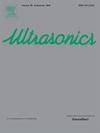Composite GW baseline enabled large range temperature compensation method based on singular value decomposition and ADALINE network
IF 4.1
2区 物理与天体物理
Q1 ACOUSTICS
引用次数: 0
Abstract
Guided wave (GW) based structural health monitoring (SHM) technology has been widely researched and applied in many engineering fields, especially in the aerospace field. However, environmental and operational conditions (EOCs) of structure like temperature variation may cause significant influence on GW signals and reduce the monitoring accuracy and reliability, which has become a major factor that hinders this technology from real applications. This paper proposes for the first time a singular value decomposition (SVD) and adaptive filter linear neural (ADALINE) network based data-driven method to compensate temperature variation caused influence on GW signal. By extracting singular vector matrices from baseline signals to train the network, the traditional ADALINE method’s dependence on signal linear correlation is eliminated. The composite baseline set composed of the generated weight matrices and one selected stored baseline signal can achieve accurate temperature compensation over a large range temperature. In order to verify the feasibility of the proposed method, experimental validations are performed on a composite skin structure under −10 °C ∼ 50 °C temperature environment. By using a stored baseline signal at −10 °C and the corresponding weights, compensation signals are accurately generated at different temperatures, in which the maximum temperature interval reaches 60 °C. The maximum errors in amplitude and phase of the compensation signal are less than −38 dB and −50 dB, which also shows a great potential for larger temperature interval of compensation.
复合GW基线实现了基于奇异值分解和ADALINE网络的大范围温度补偿方法。
基于导波的结构健康监测技术在许多工程领域得到了广泛的研究和应用,特别是在航空航天领域。然而,温度变化等结构的环境和运行条件(EOCs)可能会对GW信号产生重大影响,降低监测的精度和可靠性,这已成为阻碍该技术实际应用的主要因素。本文首次提出了一种基于奇异值分解(SVD)和自适应滤波线性神经网络(ADALINE)的数据驱动方法来补偿温度变化对GW信号的影响。通过从基线信号中提取奇异向量矩阵来训练网络,消除了传统ADALINE方法对信号线性相关的依赖。由生成的权重矩阵和一个选定的存储基线信号组成的复合基线集可以在大范围温度范围内实现精确的温度补偿。为了验证所提出方法的可行性,在-10°C ~ 50°C的温度环境下对复合蒙皮结构进行了实验验证。利用存储在-10℃的基线信号及其对应的权值,在不同温度下精确生成补偿信号,其中最高温度区间达到60℃。补偿信号的幅值和相位最大误差分别小于-38 dB和-50 dB,也显示出较大的补偿温度区间的潜力。
本文章由计算机程序翻译,如有差异,请以英文原文为准。
求助全文
约1分钟内获得全文
求助全文
来源期刊

Ultrasonics
医学-核医学
CiteScore
7.60
自引率
19.00%
发文量
186
审稿时长
3.9 months
期刊介绍:
Ultrasonics is the only internationally established journal which covers the entire field of ultrasound research and technology and all its many applications. Ultrasonics contains a variety of sections to keep readers fully informed and up-to-date on the whole spectrum of research and development throughout the world. Ultrasonics publishes papers of exceptional quality and of relevance to both academia and industry. Manuscripts in which ultrasonics is a central issue and not simply an incidental tool or minor issue, are welcomed.
As well as top quality original research papers and review articles by world renowned experts, Ultrasonics also regularly features short communications, a calendar of forthcoming events and special issues dedicated to topical subjects.
 求助内容:
求助内容: 应助结果提醒方式:
应助结果提醒方式:


